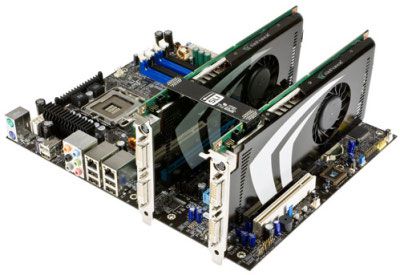From our front-page news:
NVIDIA's 9600 GT is a well-rounded card as we found out throughout numerous reviews late last month, but according to techPowerUp!, there is a new feature with the card that the company did not relay to reviewers. Even better, after some investigation, it seems most NVIDIA employees were unaware of the feature, as well.
On most GPUs, increasing the PCI-E bus frequency in the BIOS yields no performance benefits. It increases the allowed bandwidth between the GPU and the Northbridge, but the extra bandwidth normally goes to waste. On the 9600 GT however, the card automatically increases the PCI-E frequency and does result in a slightly faster card. The compared 8800 GT used in the article showed no improvement whatsoever with a faster PCI-E clock.
No gaming benchmarks were used in the article, which would have been nice, but the fill-rate feature of 3DMark 2006 showed a significant increase. The question is... why did NVIDIA not disclose this feature to reviewers or even make note of it in their press release? It's a feature that does improve performance, so it's odd to omit a mention altogether. That aside, free performance is good performance.
<table align="center"><tbody><tr><td>

</td></tr></tbody></table>
On "normal" VGA cards, when you increase the PCI-Express bus frequency you increase the theoretical bandwidth available between card and the rest of the system, but do not affect the speed the card is running at. On the GeForce 9600 GT, a 10% increase in PCI-Express frequency will make the card's core clock run 10% faster!
Source: techPowerUp!
On most GPUs, increasing the PCI-E bus frequency in the BIOS yields no performance benefits. It increases the allowed bandwidth between the GPU and the Northbridge, but the extra bandwidth normally goes to waste. On the 9600 GT however, the card automatically increases the PCI-E frequency and does result in a slightly faster card. The compared 8800 GT used in the article showed no improvement whatsoever with a faster PCI-E clock.
No gaming benchmarks were used in the article, which would have been nice, but the fill-rate feature of 3DMark 2006 showed a significant increase. The question is... why did NVIDIA not disclose this feature to reviewers or even make note of it in their press release? It's a feature that does improve performance, so it's odd to omit a mention altogether. That aside, free performance is good performance.
<table align="center"><tbody><tr><td>

</td></tr></tbody></table>
On "normal" VGA cards, when you increase the PCI-Express bus frequency you increase the theoretical bandwidth available between card and the rest of the system, but do not affect the speed the card is running at. On the GeForce 9600 GT, a 10% increase in PCI-Express frequency will make the card's core clock run 10% faster!
Source: techPowerUp!
